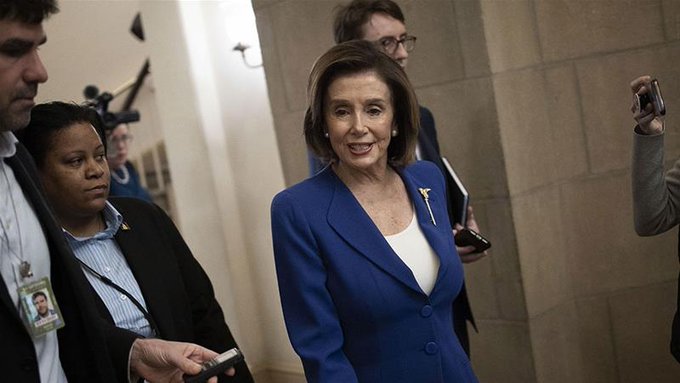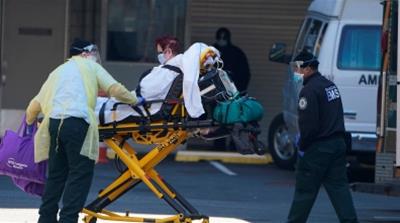US Congress approves $2.2 trillion coronavirus rescue package

The United States Congress gave final approval to a massive $2.2 trillion economic rescue bill on Friday to help lift the economy and address the coronavirus pandemic.
The Democratic-led House approved the package on a voice vote, rejecting a procedural challenge from Republican Representative Thomas Massie, who wanted a formal recorded vote.
The bill had passed the Republican-led Senate on Wednesday with overwhelming bipartisan support in a 96-0 vote. Trump has said he will immediately sign the sweeping legislation.
"We are taking care of our people," President Donald Trump said this week.
The bill is the largest rescue package in US history. Addressing the economic crisis, it offers direct payments to most Americans and special financing for big and small businesses.
"This is a pandemic that we haven't even seen for over 100 years in our country. It's really such a tragedy. So we had to take important action that puts families first and workers first and that's what we did," House Speaker Nancy Pelosi said earlier this week.
Pelosi said Congress would likely take up additional legislation in coming weeks to respond to the evolving challenge of the coronavirus, which has so far infected more than 85,000 people and killed more than 1,300 people across the US.
"Next, we'll go from emergency mitigation, to recovery," Pelosi said.
Federal agency leaders scrambled this week to develop plans to implement the new legislation, anticipating urgent demands for help from millions of people and businesses.
The coronavirus crisis has left US businesses flattened by lost business and state-mandated closures. An estimated three million small businesses will need special financing to survive and more than three million workers lost their jobs in just the last week.
As of Friday, there were more questions than answers about how the federal funding will work. Agencies cannot offer authoritative guidance on the new programmes until Trump signs the bill into law.
'Fails to address states' needs'
New York has been hit the hardest in terms of the scale and effects of the virus.
The state's governor, Andrew Cuomo, warned on Thursday the newly approved federal funding for states would not be enough to cover the need in New York, where hospitals are already being overwhelmed with patients.
"The congressional action, in my opinion, simply failed to address the governmental need," Cuomo told reporters at a news conference earlier this week.
New York estimates it will lose $10bn to $15bn in revenue because of the economic slowdown. The state would receive $5bn from the federal rescue bill passed by Congress but only for COVID-19 response, not lost revenue, Cuomo said.
State and city authorities around the US were working this week to build capacity at hospitals with more beds and respirators.
Meanwhile, Dr Deborah Birx, the Trump White House coronavirus response coordinator, said on Thursday incoming data from South Korea and Italy suggests projections of fatalities in the US may be less catastrophic than previously thought.
White House officials are discussing how to ease travel and business restrictions for areas of the country less affected by the virus.
"What we are trying to do is utilise a laser-guided approach rather than a horizontal approach," Birx said.
Trump has said he wants to reopen the country for business by April 12, despite warnings from health experts, including some within his administration, who say the US has yet to experience the worst of the pandemic.
What is in the legislation?
The Center for a Responsible Federal Budget, a non-profit group that tracks US budget deficits, scored total spending under the rescue bill at approximately $2.3 trillion.
Here is a look at where most of the money will go, according to the budget watchdog:
- $510bn - Lending for large businesses, governments
- $377bn - Small business loans and grants
- $290bn - Direct payments to most Americans
- $280bn - Cuts to business taxes
- $260bn - Expanded unemployment benefits
- $180bn - Funding for hospitals, healthcare
- $150bn - Support for state, local governments
- $72bn - Transportation, public transit
- $42bn - Social safety net, food and housing
- $45bnn - Federal emergency disaster assistance
- $32bn - Increased spending on education
- $19bn - Reductions in individual taxes
- $25bn - Other spending
![Speaker of the House Nancy Pelosi (D-CA) arrives for a briefing by Director of the National Institute of Allergy and Infectious Diseases at the National Institute of Health Dr Anthony Fauci for members of the House on coronavirus on Capitol Hill [Joshua Roberts/Reuters] Nancy Pelosi](https://www.aljazeera.com/mritems/imagecache/mbdresplarge/mritems/Images/2020/3/12/c45dbd491a2142fb9d338f4cecd3e3bb_19.jpg)






.jpeg)
Comments
Post a Comment